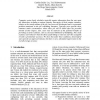Free Online Productivity Tools
i2Speak
i2Symbol
i2OCR
iTex2Img
iWeb2Print
iWeb2Shot
i2Type
iPdf2Split
iPdf2Merge
i2Bopomofo
i2Arabic
i2Style
i2Image
i2PDF
iLatex2Rtf
Sci2ools
118
click to vote
JSSPP
2004
Springer
2004
Springer
Are User Runtime Estimates Inherently Inaccurate?
Computer system batch schedulers typically require information from the user upon job submission, including a runtime estimate. Inaccuracy of these runtime estimates, relative to the actual runtime of the job, has been well documented and is a perennial problem mentioned in the job scheduling literature. Typically users provide these estimates under circumstances where their job will be killed after the provided amount of time elapses. Also, users may be unaware of the potential benefits of providing accurate estimates, such as increased likelihood of backfilling. This study examines user behavior when the threat of job killing is removed, and when a tangible reward is provided for accuracy. We show that under these conditions, about half of users provide an improved estimate, but there is not a substantial improvement in the overall average accuracy.
| Added | 02 Jul 2010 |
| Updated | 02 Jul 2010 |
| Type | Conference |
| Year | 2004 |
| Where | JSSPP |
| Authors | Cynthia Bailey Lee, Yael Schwartzman, Jennifer Hardy, Allan Snavely |
Comments (0)

